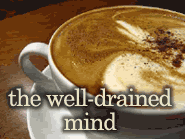Until today my library book stack was down to three: Nourishing Traditions, The Story of French, and, for my nonfiction book club this month, The Other Face of America: Chronicles of the Immigrants Shaping Our Future.
I did some serious book browsing online Friday evening, between some links to Amazon, other books they led me to, and our library's online catalog. Here's what was waiting for me when I got to the library today.
<>
How to Grow More Vegetables (and fruits, nuts, berries, grains, and other crops) Than You Ever Thought Possible on Less Land Than You Can Imagine, by John Jeavons.
Heirloom Vegetable Gardening: A Master Gardener's Guide to Planting, Seed Saving, and Cultural History, by William Woys Weaver, because I'm gonna grow some old varieties of veggies.
Earthly Delights: Tubs of Tomatoes and Buckets of Beans, by Jack Kramer, a slim paperback on the basics of growing veggies and herbs in containers.
<>
A Sand County Almanac, by Aldo Leopold. One of several environmental classics I have not read. It is a very local book, based on his land in the northern Great Plains.
When the Rivers Run Dry: Water -- the Defining Crisis of the Twenty-First Century, by Fred Pearce. I couldn't believe our library system lacked Cadillac Desert. I'm afraid this book is going to make me angry and depressed.
Our region depends very much on the Oglalla Aquifer, which I've heard is being drained beyond its capacity to recharge. That plus global climate change, which will make dry places drier (including where we live), equals time to conserve, change to drought-tolerant plantings and runoff-capturing landscaping, and think seriously about rainwater catchment. Those books are on interlibrary loan request.
I ended up with these two books after...
I did a little research on environmental education, hoping to find something helpful to use with the boys for exploration of our part of the southern Great Plains. I easily found nationally respected programs focused on birds (Project Backyard Habitat, or some such thing), animals (Project WILD), forests (Project something else), and wetlands (Project some other thing), and even a sort of interesting program focused on agriculture (but a bit too "monster-scale farming is great"), but I was getting a bit frustrated. Oklahoma is not generally known for wetlands or forests, and animal study does NOT float my boat, though the backyard birds thing might do.
I began to wish for something like Project Plains, or Project Grassland and Stream Hollows and Farmland, or Project Living Locally, or Project Know What Your Way of Life Relies On (but not funded by chemical or oil companies). Maybe even Project Wendell Berry. Not so much luck with those, but I did find some stuff based on Aldo Leopold's writings: The Leopold Project: Education in a Land Ethic. So... I figured I'd better read the book first.
If you're interested in Project WILD or other such programs (oh, and the trees one is Project Learning Tree, and wetlands is Project WET), there are great lists at Classroom Earth.
<>
Finally, I checked out a historical fiction book from the Teen section of the library after Son1 read the description on the back cover and rejected it. Silly boy! It looked great to me: a 1947 Newbery Honor Book set in and around England's Glastonbury Abbey in 1171. The book is The Hidden Treasure of Glaston, by Eleanore M. Jewett.
Subscribe to:
Post Comments (Atom)






2 comments:
Gosh, thanks for all these book titles - I'm afraid it will make my book pile on my nightstand even higher (with more dust and guilt piling up, too)!
Hahaha -- I'm right there with you! I'm currently book rich, trying madly to finish The Story of French 'cause it's overdue AND I have these new books to dip into before *they* are due as well. I'm considering a new daily schedule that includes two hours of reading for the kids... and me :)
Post a Comment